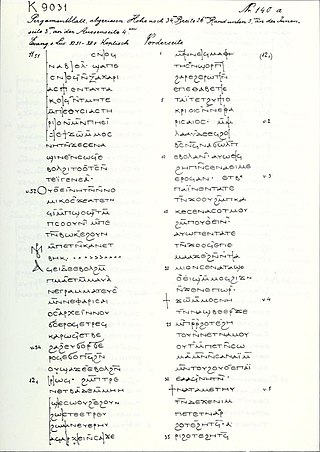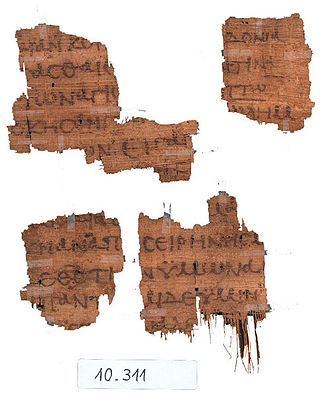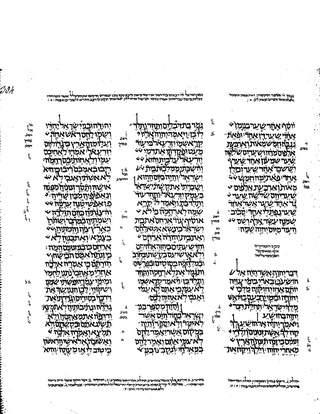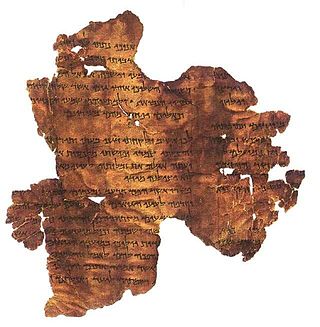Related Research Articles

The Second Epistle to Timothy is one of the three pastoral epistles traditionally attributed to Paul the Apostle. Addressed to Timothy, a fellow missionary, it is traditionally considered to be the last epistle he wrote before his death. The original language is Koine Greek.

John 3 is the third chapter of the Gospel of John in the New Testament of the Christian Bible. It deals with Jesus' conversation with Nicodemus, one of the Jewish pharisees, and John the Baptist's continued testimony regarding Jesus. Baptist preacher Charles Spurgeon said of this chapter that it is the one he would choose "to read to a dying man who did not know the gospel, [as] the most suitable one for such an occasion".

Luke 12 is the 12th chapter of the Gospel of Luke in the New Testament of the Christian Bible. It records a number of teachings and parables told by Jesus Christ when "an innumerable multitude of people had gathered together", but addressed "first of all" to his disciples. The book containing this chapter is anonymous, but early Christian tradition uniformly affirmed that Luke the Evangelist composed this Gospel as well as the Acts of the Apostles.

Revelation 12 is the twelfth chapter of the Book of Revelation or the Apocalypse of John in the New Testament of the Christian Bible. The book is traditionally attributed to John the Apostle, but the precise identity of the author remains a point of academic debate. This chapter contains the accounts about the woman, the dragon, and the child, followed by the war between Michael and the dragon, then the appearance of the monster from the sea. William Robertson Nicoll, a Scottish Free Church minister, suggests that in this chapter the writer has created a Christianised version of a Jewish source which "described the birth of the Messiah in terms borrowed from ... cosmological myths [such as] that of the conflict between the sun-god and the dragon of darkness and the deep".

Acts 23 is the twenty-third chapter of the Acts of the Apostles in the New Testament of the Christian Bible. It records the period of Paul's imprisonment in Jerusalem and then in Caesarea. The book containing this chapter is anonymous, but early Christian tradition uniformly affirmed that Luke composed this book as well as the Gospel of Luke.

Romans 3 is the third chapter of the Epistle to the Romans in the New Testament of the Christian Bible. It was composed by Paul the Apostle, while he was in Corinth in the mid-50s AD, with the help of an amanuensis (secretary), Tertius, who added his own greeting in Romans 16:22.
Romans 8 is the eighth chapter of the Epistle to the Romans in the New Testament of the Christian Bible. It was authored by Paul the Apostle, while he was in Corinth in the mid-50s AD, with the help of an amanuensis (secretary), Tertius, who added his own greeting in Romans 16:22. Chapter 8 concerns "the Christian's spiritual life".

Romans 15 is the fifteenth chapter of the Epistle to the Romans in the New Testament of the Christian Bible. It is authored by Paul the Apostle, while he was in Corinth in the mid-50s AD, with the help of an amanuensis (secretary), Tertius, who adds his own greeting in Romans 16:22.

1 Timothy 1 is the first chapter of the First Epistle to Timothy in the New Testament of the Christian Bible. The author has been traditionally identified as Paul the Apostle since as early as AD 180, although most modern scholars consider the letter pseudepigraphical, perhaps written as late as the first half of the second century AD.

1 Timothy 4 is the fourth chapter of the First Epistle to Timothy in the New Testament of the Christian Bible. The author has been traditionally identified as Paul the Apostle since as early as AD 180, although most modern scholars consider the letter pseudepigraphical, perhaps written as late as the first half of the second century AD.

1 Timothy 6 is the sixth and final chapter of the First Epistle to Timothy in the New Testament of the Christian Bible. The author has been traditionally identified as Paul the Apostle since as early as AD 180, although most modern scholars consider the letter pseudepigraphical, perhaps written as late as the first half of the second century AD.

Titus 2 is the second chapter of the Epistle to Titus in the New Testament of the Christian Bible. The letter is traditionally attributed to Paul the Apostle, sent from Nicopolis of Macedonia, addressed to Titus in Crete. Some scholars argue that it is the work of an anonymous follower, written after Paul's death in the first century AD. This chapter describes the qualities of members of the community and doctrinal statements regarding the death of Christ in relation to the removal of sin.
In Protestant theology, verbal plenary preservation (VPP) is a doctrine concerning the nature of the Bible. While verbal plenary inspiration (VPI) applies only to the original autographs of the Bible manuscript, VPP views that, "the whole of scripture with all its words even to the jot and tittle is perfectly preserved by God in the apographs without any loss of the original words, prophecies, promises, commandments, doctrines, and truths, not only in the words of salvation, but also the words of history, geography and science; and every book, every chapter, every verse, every word, every syllable, every letter is infallibly preserved by the Lord Himself to the last iota so that the Bible is not only infallible and inerrant in the past, but also infallible and inerrant today ."
Isaiah 42 is the forty-second chapter of the Book of Isaiah in both the Hebrew Bible and the Old Testament of the Christian Bible. This book contains the prophecies attributed to the prophet Isaiah, and is a part of the Books of the Prophets. Chapters 40-55 are known as "Deutero-Isaiah" and date from the time of the Israelites' exile in Babylon. This chapter contains a poem known as the first of the "Servant songs" about the servant, whom Jewish tradition holds that Isaiah identifies as either the Israelites themselves or Cyrus.
Isaiah 40 is the fortieth chapter of the Book of Isaiah in the Hebrew Bible or the Old Testament of the Christian Bible, and the first chapter of the section known as "Deutero-Isaiah", dating from the time of the Israelites' exile in Babylon. This book contains the prophecies attributed to the prophet Isaiah, and is one of the Books of the Prophets. Parts of this chapter are cited in all four canonical Gospels of the New Testament.
Isaiah 9 is the ninth chapter of the Book of Isaiah in the Hebrew Bible or the Old Testament of the Christian Bible. This book contains the prophecies attributed to the prophet Isaiah, and is one of the Nevi'im.
Isaiah 66 is the sixty-sixth and final chapter of the Book of Isaiah in the Hebrew Bible or the Old Testament of the Christian Bible. This book contains the prophecies attributed to the prophet Isaiah, and is one of the Books of the Prophets. Chapters 56–66 are often referred to as Trito-Isaiah. This chapter contains an oracle delivered after the temple in Jerusalem had been re-built following the Jewish peoples' return from exile, and warns against "an unduly materialistic" approach to the worship of God.

Zechariah 2 is the second of the 14 chapters in the Book of Zechariah in the Hebrew Bible or the Old Testament of the Christian Bible. This book contains the prophecies attributed to the prophet Zechariah, and is a part of the Book of the Twelve Minor Prophets. This chapter is a part of a section consisting of Zechariah 1–8. It records the third of eight visions received by the prophet, followed by an oracle calling the exiles to return to the city where Yahweh is about to dwell and all nations will come.

Hosea 10 is the tenth chapter of the Book of Hosea in the Hebrew Bible or the Old Testament of the Christian Bible. In the Hebrew Bible it is a part of the Book of the Twelve Minor Prophets. This chapter contains prophecies attributed to the prophet Hosea, son of Beeri, dated by the Jamieson-Fausset-Brown Bible Commentary to the period between Shalmaneser V's first and second invasions of Israel. Israel is reproved and threatened for its impiety and idolatry, and exhorted to repentance.

Ezekiel 12 is the twelfth chapter of the Book of Ezekiel in the Hebrew Bible or the Old Testament of the Christian Bible. This book contains the prophecies attributed to the prophet/priest Ezekiel, and is one of the Books of the Prophets. In this chapter, Ezekiel undertakes the "mime of the emigrant" and the chapter concludes with condemnation of some "popular proverbs".
References
- ↑ 2 Timothy (KJV) Chapter 4
- 1 2 Wigram, George (July 1, 1996). The Englishman's Greek Concordance of New Testament. Hendrickson Publishers, Inc.
- 1 2 3 Ellicott, C.J. (1878). A New Testament commentary for English readers. New York: E.P. Dutton.
- ↑ Barnes, Albert (1949). Barnes' New Testament Notes. Grand Rapids, Michigan: Baker Book House.
- ↑ Cambridge Bible for schools and colleges. Cambridge, England: University Press. 1883.
- ↑ Poole, Matthew (1853). Commentary on the Holy Bible. Robert Carter and Brothers.